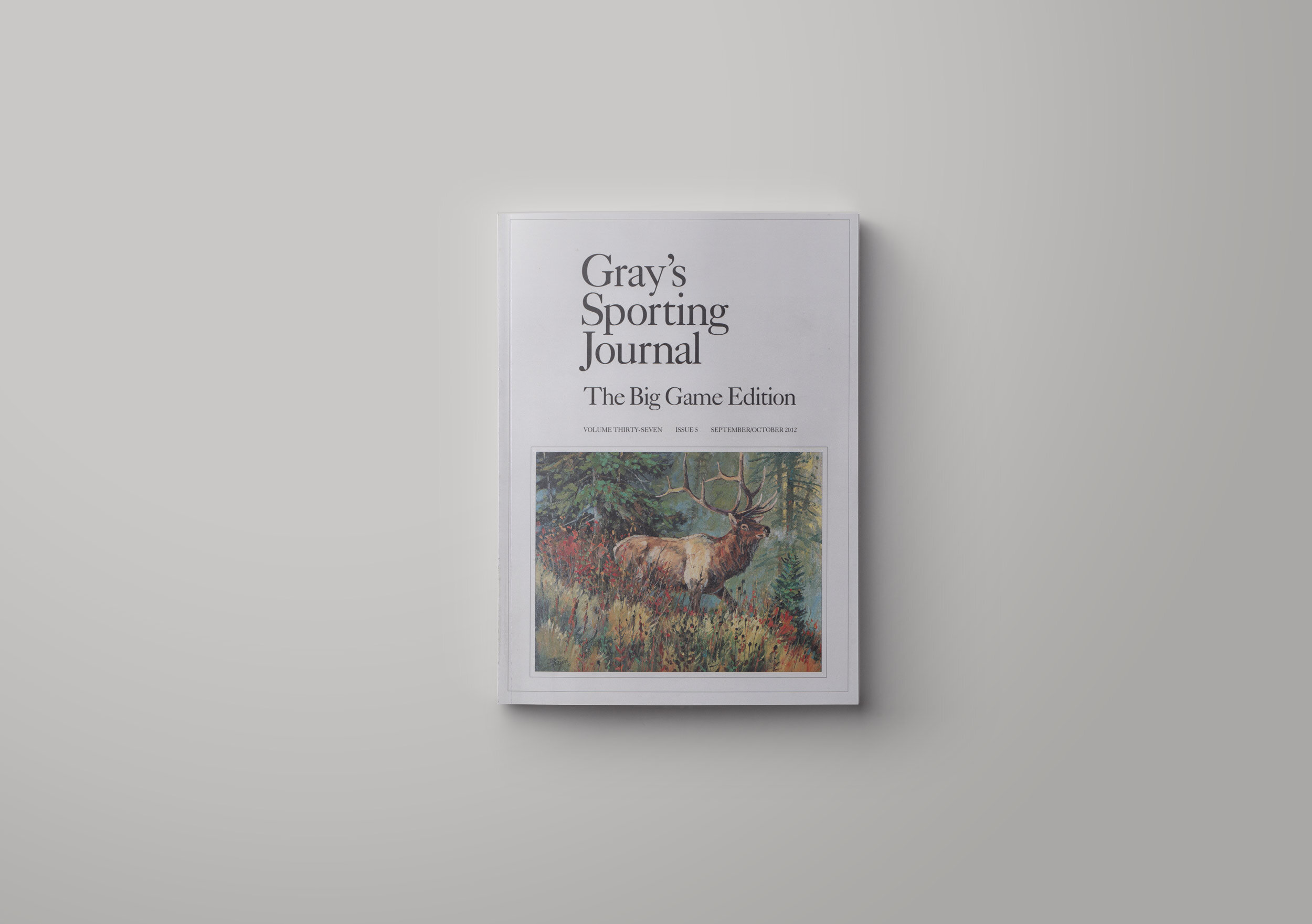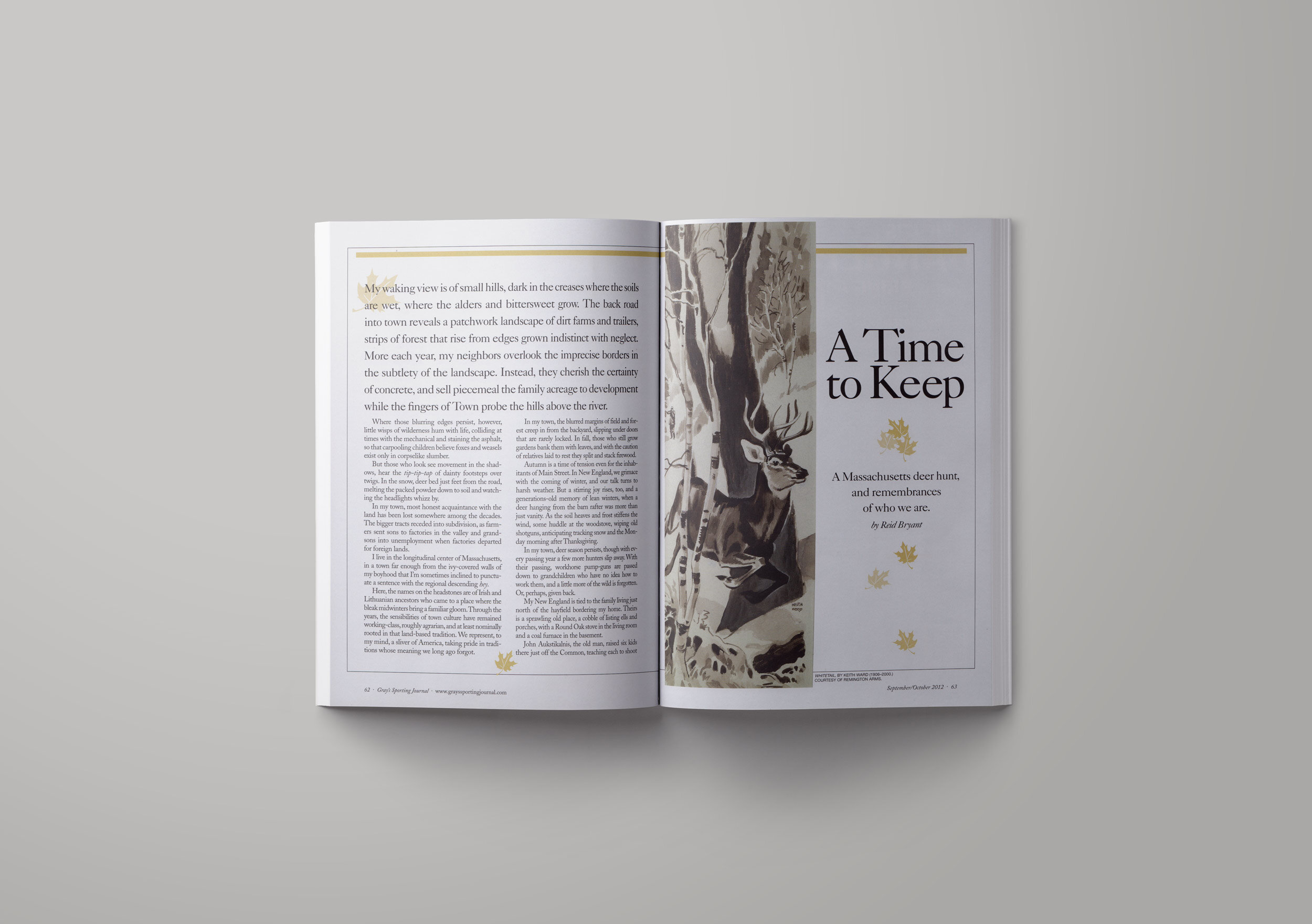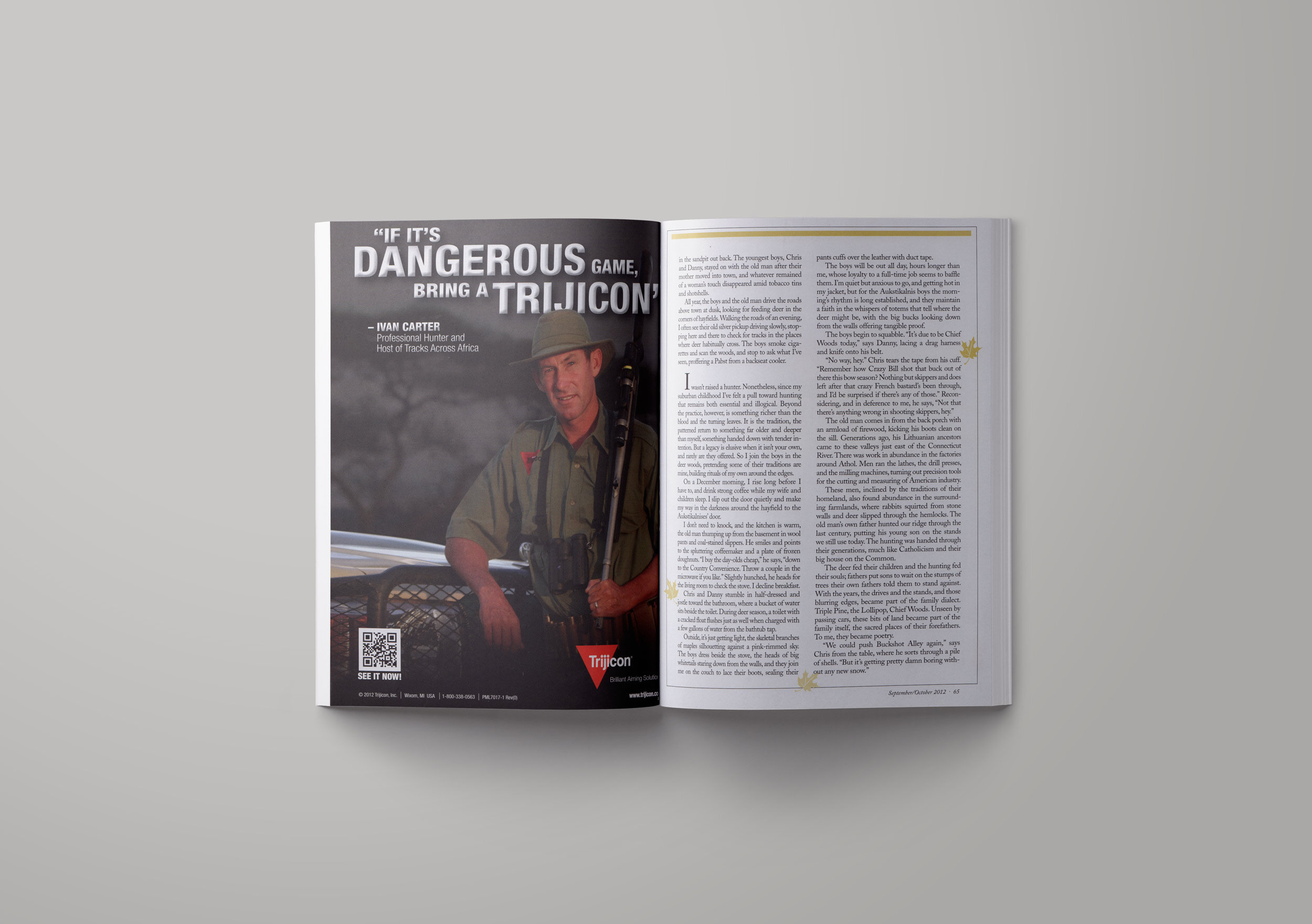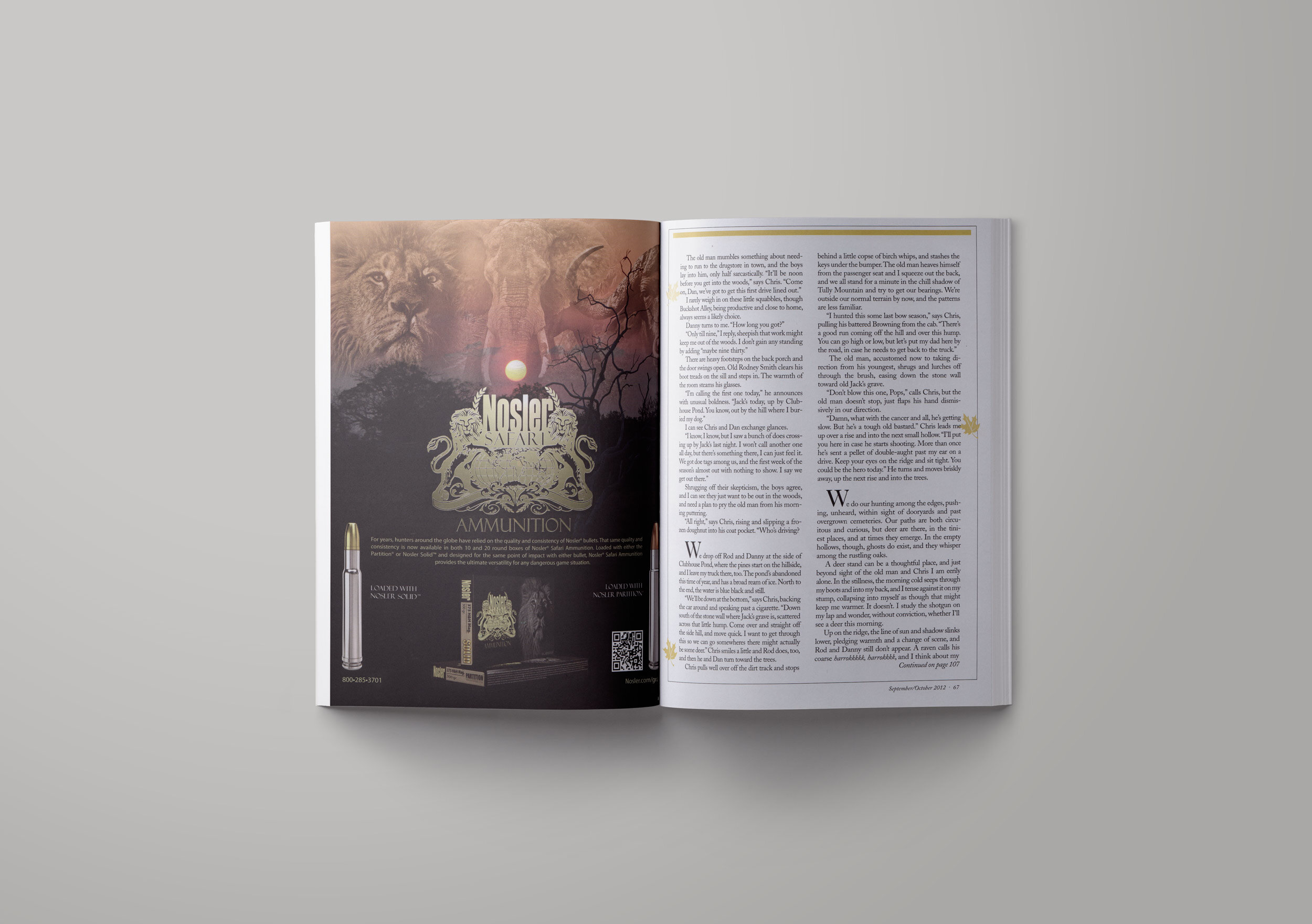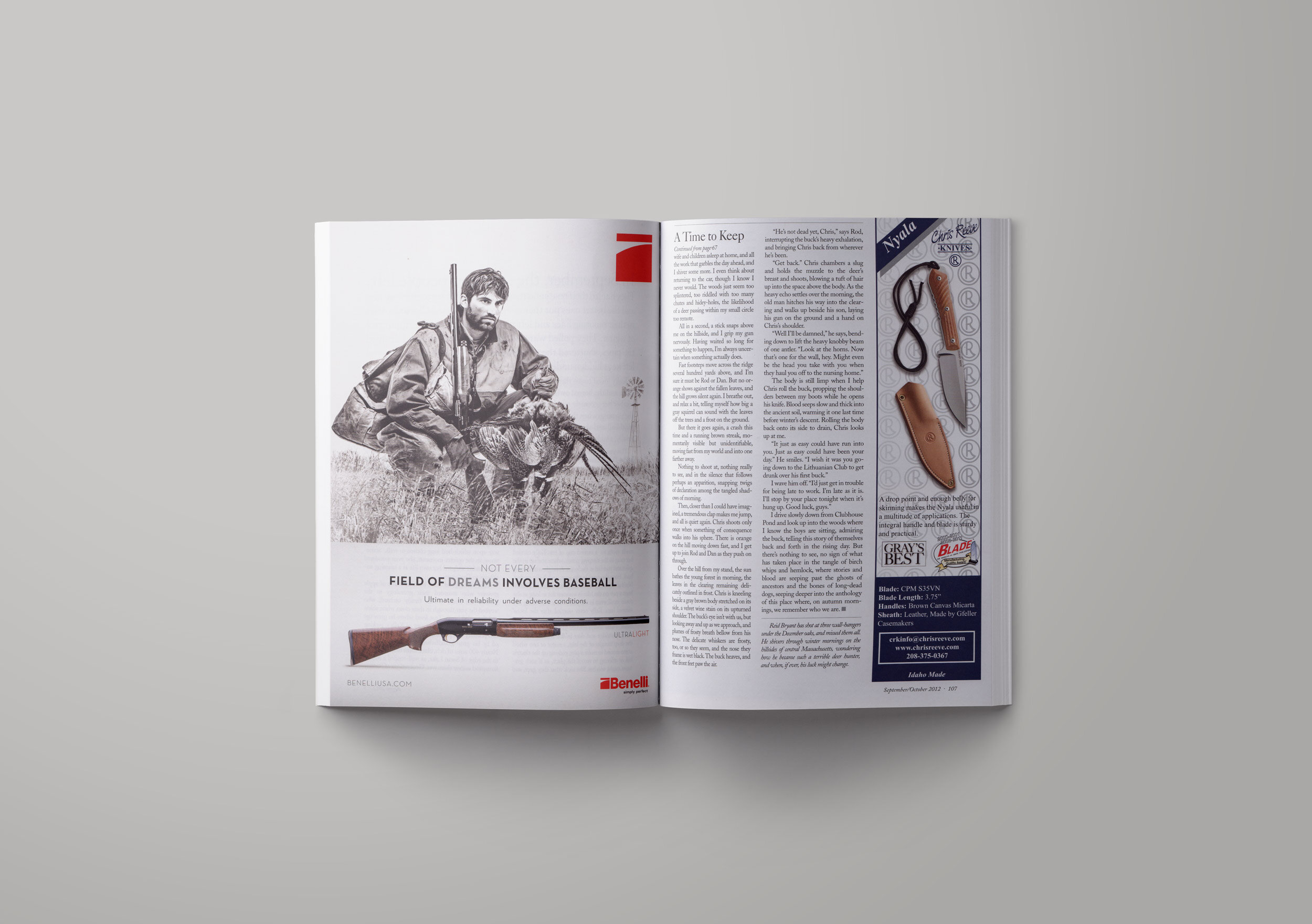A Time to Keep
My waking view is of small hills, dark in the creases where the soils are wet, where the alders and bittersweet grow. The backroad into town reveals a patchwork landscape of dirt farms and trailers, strips of forest that rise from edges grown indistinct with neglect. More each year, my neighbors overlook the imprecise borders in the subtlety of the landscape. Instead, they cherish the certainty of concrete, and sell piecemeal the family acreage to development while the fingers of Town probe the hills above the river.
Where those blurring edges persist, however, little wisps of wilderness hum with life, colliding at times with the mechanical and staining the asphalt, so that carpooling children believe foxes and weasels exist only in corpselike slumber.
But those who look see movement in the shadows, hear the tip-tip-tap of dainty footsteps over twigs. In the snow, deer bed just feet from the road, melting the packed powder down to soil and watching the headlights whizz by.
In my town, most honest acquaintance with the land has been lost somewhere among the decades. The bigger tracts receded into subdivision, as farmers sent sons to factories in the valley and grandsons into unemployment when factories departed for foreign lands.
I live in the longitudinal center of Massachusetts, in a town far enough from the ivy-covered walls of my boyhood that I’m sometimes inclined to punctuate a sentence with the regional descending hey.
Here, the names on the headstones are of Irish and Lithuanian ancestors who came to a place where the bleak midwinters bring a familiar gloom. Through the years, the sensibilities of town culture have remained working-class, roughly agrarian, and at least nominally rooted in that land-based tradition. We represent, to my mind, a sliver of America, taking pride in traditions whose meaning we long ago forgot.
In my town, the blurred margins of field and forest creep in from the backyard, slipping under doors that are rarely locked. In fall, those who still grow gardens bank them with leaves, and with the caution of relatives laid to rest split and stack extra firewood.
Autumn is a time of tension even for the inhabitants of Main Street. In New England, we grimace with the coming of winter, and our talk turns to harsh weather. But a stirring joy rises, too, and a generations-old memory of lean winters, when a deer hanging from the barn rafter was more than just vanity. As the soil heaves and frost stiffens the wind, some huddle at the woodstove, wiping old shotguns, anticipating tracking snow and the Monday morning after Thanksgiving.
In my town, deer season persists, though with every passing year a few more hunters slip away. With their passing, workhorse pump-guns are passed down to grandchildren who have no idea how to work them, and a little more of the wild is forgotten, or, perhaps, given back.
My New England is tied to the family living just north of the hayfield bordering my home. Theirs is a sprawling old place, a cobble of listing ells and porches, with a Round Oak stove in the living room and a coal furnace in the basement.
John Aukstikalnis, the old man, raised six kids there just off the Common, teaching each to shoot in the sandpit out back. The youngest boys, Chris and Danny, stayed on with the old man after their mother moved into town, and whatever remained of a woman’s touch disappeared amid tobacco tins and shotshells.
All year, the boys and the old man drive the roads above town at dusk, looking for feeding deer in the corners of hayfields. Walking the roads of an evening, I often see their old silver pickup driving slowly, stopping here and there to check for tracks in the places where deer habitually cross. The boys smoke cigarettes and scan the woods, and stop to ask what I’ve seen, proffering a Pabst from a backseat cooler.
*
I wasn’t raised a hunter. Nonetheless, since my suburban childhood I’ve felt a pull toward hunting that remains both essential and illogical. Beyond the practice, however, is something richer than the blood and the turning leaves. It is the tradition, the patterned return to something far older and deeper than myself, something handed down with tender intention. But a legacy is elusive when it isn’t your own, and rarely are they offered. So I join the boys in the deer woods, pretending some of their traditions are mine, building rituals of my own around the edges.
On a December morning, I rise long before I have to, and drink strong coffee while my wife and children sleep. I slip out the door quietly and make my way in the darkness around the hayfield to the Aukstikalnis’ door.
I don’t need to knock, and the kitchen is warm, the old man thumping up from the basement in wool pants and coal-stained slippers. He smiles and points to the spluttering coffeemaker and a plate of frozen doughnuts. “I buy the day-olds cheap,” he says, “down to the Country Convenience. Throw a couple in the microwave if you like.” Slightly hunched, he heads for the living room to check the stove. I decline breakfast.
Chris and Danny stumble in half-dressed and jostle toward the bathroom, where a bucket of water sits beside the toilet. During deer season, a toilet with a cracked float flushes just as well when charged with a few gallons of water from the bathtub tap.
Outside, it’s just getting light, the skeletal branches of maples silhouetting against a pink-rimmed sky. The boys dress beside the stove, the heads of big whitetails staring down from the walls, and they join me on the couch to lace their boots, sealing their pants cuffs over the leather with duct tape.
The boys will be out all day, hours longer than me, whose loyalty to a full-time job seems to baffle them. I’m quiet but anxious to go, and getting hot in my jacket, but for the Aukstikalnis boys the morning’s rhythm is long established, and they maintain a faith in the whispers of totems that tell where the deer might be, with the big bucks looking down from the walls offering tangible proof.
The boys begin to squabble. “It’s due to be Chief Woods today,” says Danny, lacing a drag harness and knife onto his belt.
“No way, hey.” Chris tears the tape from his cuff. “Remember how Crazy Bill shot that buck out of there this bow season? Nothing but skippers and does left after that crazy French bastard’s been through, and I’d be surprised if there’s any of those.” Reconsidering, and in deference to me, he says, “Not that there’s anything wrong in shooting skippers, hey.”
The old man comes in from the back porch with an armload of firewood, kicking his boots clean on the sill. Generations ago, his Lithuanian ancestors came to these valleys just east of the Connecticut River. There was work in abundance in the factories around Athol. Men ran the lathes, the drill presses, and the milling machines, turning out precision tools for the cutting and measuring of American industry.
These men, inclined by the traditions of their homeland, also found abundance in the surrounding farmlands, where rabbits squirted from stone walls and deer slipped through the hemlocks. The old man’s own father hunted our ridge through the last century, putting his young son on the stands we still use today. The hunting was handed through their generations, much like Catholicism and their big house on the Common.
The deer fed their children and the hunting fed their souls; fathers put sons to wait on the stumps of trees their own fathers told them to stand against. With the years, the drives and the stands, and those blurring edges, became part of the family dialect. Triple Pine, the Lollipop, Chief Woods. Unseen by passing cars, these bits of land became part of the family itself, the sacred places of their forefathers. To me, they became poetry.
“We could push Buckshot Alley again,” says Chris from the table, where he sorts through a pile of shells. “But it’s getting pretty damn boring without any new snow.”
The old man mumbles something about needing to run to the drugstore in town, and the boys lay into him, only half sarcastically. “It’ll be noon before you get into the woods,” says Chris. “Come on Dan, we’ve got to get this first drive lined out.”
I rarely weigh in on these little squabbles, though Buckshot Alley, being productive and close to home, always seems a likely choice.
Danny turns to me. “How long you got?”
“Only till nine,” I reply, sheepish that work might keep me out of the woods. I don’t gain any standing by adding “maybe nine-thirty.”
There are heavy footsteps on the back porch and the door swings open. Old Rodney Smith clears his boot treads on the sill and steps in. The warmth of the room steams his glasses.
“I’m calling the first one today,” he announces with unusual boldness. “Jack’s today, up by Clubhouse Pond. You know, out by the hill where I buried my dog.”
I can see Chris and Dan exchange glances.
“I know, I know, but I saw a bunch of does crossing up by Jack’s last night. I won’t call another one all day, but there’s something there, I can just feel it. We got doe tags among us, and the first week of the season’s almost out with nothing to show. I say we get out there.”
Shrugging off their skepticism, the boys agree, and I can see they just want to be out in the woods, and need a plan to pry the old man from his morning puttering.
“Alright,” says Chris, rising and slipping a frozen doughnut into his coat pocket. “Who’s driving?
*
We drop off Rod and Danny at the side of Clubhouse Pond, where the pines start on the hillside, and I leave my truck there, too. The pond’s abandoned this time of year, and has a broad ream of ice. North to the end, the water is blue-black and still.
“We’ll be down at the bottom,” says Chris, backing the car around and speaking past a cigarette. “Down south of the stone wall where Jack’s grave is, scattered across that little hump. Come over and straight off the side hill, and move quick. I want to get through this so we can go somewheres there might actually be some deer.” Chris smiles a little and Rod does, too, and then he and Dan turn toward the trees.
Chris pulls well over off the dirt track and stops behind a little copse of birch whips, and stashes the keys under the bumper. The old man heaves himself from the passenger seat and I squeeze out the back, and we all stand for a minute in the chill shadow of Tully Mountain and try to get our bearings. We’re outside our normal terrain by now, and the patterns are less familiar.
“I hunted this some last bow season,” says Chris, pulling his battered Browning from the cab. “There’s a good run coming off the hill and over this hump. You can go high or low, but let’s put my dad here by the road, in case he needs to get back to the truck.”
The old man, accustomed now to taking direction from his youngest, shrugs and lurches off through the brush, easing down the stone wall toward old Jack’s grave.
“Don’t blow this one, Pops,” calls Chris, but the old man doesn’t stop, just flaps his hand dismissively in our direction.
“Damn, what with the cancer and all, he’s getting slow. But he’s a tough old bastard.” Chris leads me up over a rise and into the next small hollow. “I’ll put you here in case he starts shooting. More than once he’s sent a pellet of double-ought past my ear on a drive. Keep your eyes on the ridge and sit tight. You could be the hero today.” He turns and moves briskly away, up the next rise and into the trees.
*
We do our hunting among the edges, pushing, unheard, within sight of dooryards and past overgrown cemeteries. Our paths are both circuitous and curious, but deer are there, in the tiniest of places, and at times they emerge. In the empty hollows, though, ghosts do exist, and they whisper among the rustling oaks.
A deer stand can be a thoughtful place, and just beyond sight of the old man and Chris I am eerily alone. In the stillness, the morning cold seeps through my boots and into my back, and I tense against it on my stump, collapsing into myself as though that might keep me warmer. It doesn’t. I study the shotgun on my lap and wonder, without conviction, whether I’ll see a deer this morning.
Up on the ridge, the line of sun and shadow slinks lower, pledging warmth and a change of scene, and Rod and Danny still don’t appear. A raven calls his coarse harrokkkkk, harrokkkk, and I think about my wife and children asleep at home, and all the work that garbles the day ahead, and I shiver some more. I even think about returning to the car, though I know I never would. The woods just seem too splintered, too riddled with too many chutes and hidey-holes, the likelihood of a deer passing within my small circle too remote.
All in a second, a stick snaps above me on the hillside, and I grip my gun nervously. Having waited so long for something to happen, I’m always uncertain when something actually does.
Fast footsteps move across the ridge several hundred yards above, and I’m sure it must be Rod or Dan. But no orange shows against the fallen leaves, and the hill grows silent again. I breathe out, and relax a bit, telling myself how big a gray squirrel can sound with the leaves off the trees and a frost on the ground.
But there it goes again, a crash this time and a running brown streak, momentarily visible but unidentifiable, moving fast from my world and into one farther away.
Nothing to shoot at, nothing really to see, and in the silence that follows perhaps an apparition, snapping twigs of declaration among the tangled shadows of morning.
Then, closer than I could have imagined, a tremendous clap makes me jump, and all is quiet again. Chris shoots only once when something of consequence walks into his sphere. There is orange on the hill moving down fast, and I get up to join Rod and Dan as they push on through.
Over the hill from my stand, the sun bathes the young forest in morning, the leaves in the clearing remaining delicately outlined in frost. Chris is kneeling beside a gray-brown body stretched on its side, a velvet wine stain on its upturned shoulder. The buck’s eye isn’t with us, but looking away and up as we approach, and plumes of frosty breath bellow from his nose. The delicate whiskers are frosty, too, or so they seem, and the nose they frame is wet black. The buck heaves, and the front feet paw the air.
“He’s not dead yet, Chris,” says Rod, interrupting the buck’s heavy exhalation, and bringing Chris back from wherever he’s been.
“Get back.” Chris chambers a slug and holds the muzzle to the deer’s breast and shoots, blowing a tuft of hair up into the space above the body. As the heavy echo settles over the morning, the old man hitches his way into the clearing and walks up beside his son, laying his gun on the ground and a hand on Chris’s shoulder.
“Well I’ll be damned,” he says, bending down to lift the heavy knobby beam of one antler. “Look at the horns. Now that’s one for the wall, hey. Might even be the head you take with you when they haul you off to the nursing home.”
The body is still limp when I help Chris roll the buck, propping the shoulders between my boots while he opens his knife. Blood seeps slow and thick into the ancient soil, warming it one last time before winter’s descent. Rolling the body back onto its side to drain, Chris looks up at me.
“It just as easy could have run into you. Just as easy could have been your day.” He smiles. “I wish it was you going down to the Lithuanian Club to get drunk over his first buck.”
I wave him off. “I’d just get in trouble for being late to work. I’m late as it is. I’ll stop by your place tonight when it’s hung up. Good luck, guys.”
I drive slowly down from Clubhouse Pond and look up into the woods where I know the boys are sitting, admiring the buck, telling this story of themselves back and forth in the rising day. But there’s nothing to see, no sign of what has taken place in the tangle of birch whips and hemlock, where stories and blood are seeping past the ghosts of ancestors and the bones of long-dead dogs, seeping deeper into the anthology of this place where, on Autumn mornings, we remember who we are.
First published in Gray’s Sporting Journal
